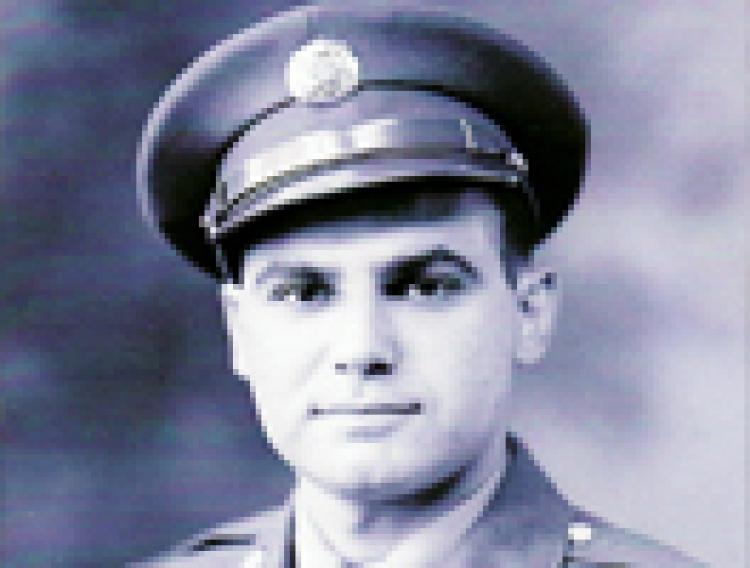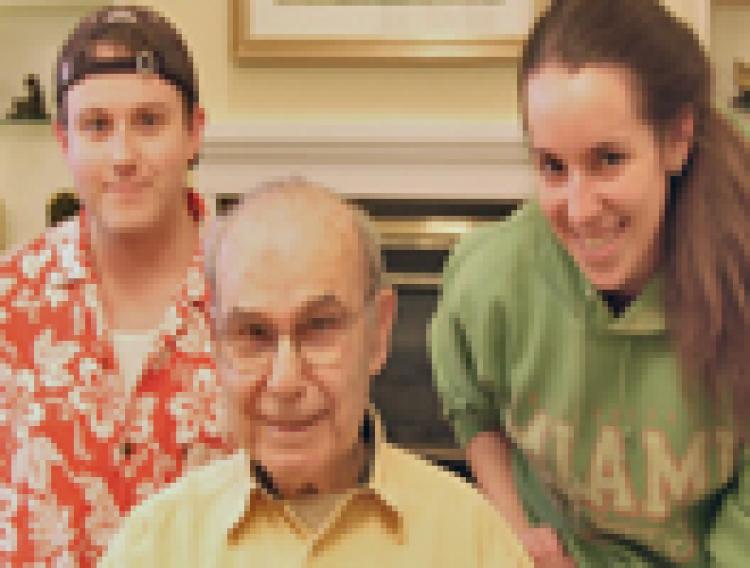Irv Hoffman
Irv Hoffman was born in Brooklyn, New York in the year 1918. At 21, he moved to Washington for a job with the Census Bureau, where he met his future wife, Pearl, with whom he had three beautiful daughters. His several jobs in Washington included building the Pentagon. CPA’s never retire, so he is still at it part-time by telephone. In late 2007, he and his wife moved to Boulder at the urging of his children and grandchildren who lived there, to start a new phase in his life at The Academy, which they expect to be very enjoyable.

Click image to enlarge
Hustling My Way Through the Final Months of the War
I have been asked, “What lasting effect, if any, did your Army service in World War II have on your life?” In general, I would say that the close relationship and interdependence with my army buddies and the opportunity to meet and work with Europeans, both military and civilian, in all walks of life, was an educational and broadening experience. But there was something more. The dearth of creature comforts and the uncertainty of the future made me and most GIs “experts” at scrounging, or maybe more like hustling, for creature comforts and new experiences.
In August of 1945, shortly after the war in Europe had ended, my unit was being sent from Germany to the Pacific since the war with Japan was still going on. We were on a coal burning freight train going to Marseille and with the condition that the countries were in due to the war, it made for a long and slow ride, with many stops along the way. One day on the train, I decided to climb to the front and started to chat with the French engineer. After talking for a while, I asked him if I could drive the train. At first the engineer said no. I didn’t leave and continued talking to him. In the middle of our conversation, I started smoking a cigar that my wife had sent me. Cigars were almost impossible to come by during the war, and the engineer looked at me longingly, like he wanted one too. Noticing this, I offered him one. This clenched the deal, and he let me drive the train. That was definitely a new experience for me.
While in Marseille, as part of our recreation, two men at a time were given a two-day pass to Paris, but since traveling was so difficult, it turned out to be more like a five-day trip. Because the Lieutenant owed me a lot of money from poker and other card games, I wrote up an order for “official business” to Paris, and he signed it. We got to spend five days there instead of two because we got to use a plane instead of a train like everyone else.
Before we went to Paris, we were given an American twenty-dollar bill to enhance our bargaining power in the black market, where we could sell the twenty-dollar bill. I myself sold mine for one hundred and ten dollars in occupation money. I had a little camera that I had bought from a GI that I wanted to sell. Someone told me the best procedure to sell it was to go into a bar, put it on the table, and wait for someone to approach me about it. Eventually, someone offered to buy the camera but we couldn’t arrive at a mutually satisfying price, so we couldn’t make a deal. I went into the center of Paris and a couple of men came up to me about the camera and I told them that it would cost one hundred and twenty dollars. The two men were talking to one another about this offer and they didn’t know that I could hear them. However, they were talking in Yiddish, not knowing that I could understand them. Eventually, they decided to buy the camera.
This sort of exchange was not unusual at the time. Everyone was trading and buying from each other, since there was no other way to do it. However, money wasn’t the most important thing to have in order to trade. Soap and cigarettes were much more valuable. Because I had the soap and cigarettes that were rationed from the army, I would walk through the nice shops and use those to trade for French perfumes for my wife and my sisters.
Our Camp
At our camp, there were a lot of crap games going on. The game that was played was Acey Deucey, and everyone that was there would bet on it. There was a lot of money at stake and I started to play. When the GI’s who were running the game left, my friends and I took over and made a lot of money until our ship came in. While running the games, there were several disputes due to side betting, but we were able to control them. This was very lucky since there were so many people walking around with knives and guns. While we were waiting for the ship to the Pacific, we were notified that we were no longer going there since the war in Japan was over, and that we were going to go directly home instead!
When we got on the ship, I gave the ship’s carpenter twenty dollars to build a table for us and not for anyone else in order to monopolize the craps games on the ship. At night, my buddies and I took turns sleeping on the table to make sure nothing happened to it. Everyone had ignored all of the rules about no gambling on the ship. After about four days, my buddy was sleeping on the table and when he woke up the next morning, he had been moved to the deck, and the table had been thrown off the ship!
After the war was over, I got a job in a public accounting office. However, I took on another job as well since the first job did not pay very much. I had contacted a friend who was still in Germany, where he told me that France and the rest of Europe had a high demand for nylon hose. I contacted a women’s wear client, and bought a lot of them for a dollar a pair. I then posted an ad in the International Herald Tribune to sell them to Europeans. This was the start of the Pearl Trading Company.

Click image to enlarge
My partner in this plan told me that he could get some Chanel Number 5 perfume from France, so I told him to ship it to me. The U.S. Customs seized the shipment and told me that under the law, an individual could only import one bottle of perfume for personal use unless they had permission from the Chanel Company. After finding out the details of the law, I wrote Chanel a letter to convince them that I should be allowed to sell it, but they refused. I was told by the U.S. Customs Division that if I didn’t pick up the shipment within a week, the perfume was to be dumped into the sewers in Baltimore. So I went to the Baltimore Customs office and was told that if I scratched off the Chanel lettering from the bottles, I could take the perfume. They allowed me to take the carton to a machine shop to have the lettering removed. I then gave the man at the customs office a bottle of perfume as thanks, and then I was allowed to take the perfume.
Europe was also in need of cigarettes and my friend said that cigarettes could be sold like gold. My friend over there told me that if I sent him a wholesale carton of cigarettes, about forty cartons of ten packs each, he could sell them. But then my friend told me that he wanted the cigarettes as a favor. That was the end of the Pearl Trading Company.
The first real job I got in private accounting was working for a public accounting practice owned by a man who was previously controller for the Washington Post. I worked there for two years and was paid 45 dollars a week and after the first year I was given a raise to 50 dollars a week. My boss later said that he could try to give me 55 dollars a week, but he couldn’t afford it. I started to look for another job at that point and found one with a larger local practice. He asked me what kind of salary I was looking for, and I asked for 75 dollars a week and he gave it to me. I stayed with them for a long time and became a partner and had a satisfying career in public accounting.
Was my Army experience useful? I think so.

